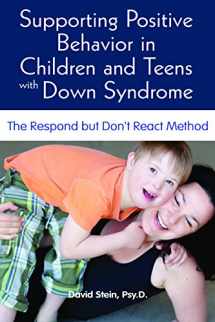
Supporting Positive Behavior in Children and Teens With Down Syndrome: The Respond but Don't React Method
Book details
Summary
Description
A child doesn't want to leave the toy store, so he stops and flops. Another bolts across a busy parking lot, turns and smiles at his mom. An eighteen-year-old student bursts into tears when asked to change activities at school. Sound familiar?
These and other common behavior issues in children with Down syndrome can quickly become engrained and may even persist into adulthood. No parent wants that to happen, and thankfully, help is available! Dr. David Stein, a psychologist and Co-Director of the Down Syndrome Program at Boston Children's Hospital, shares his approach to behavior management in this new book for parents.
Supporting Positive Behavior in Children and Teens with Down Syndrome examines how the brain of a person with Down syndrome works, how those differences impact behavior, and why bad behavior should not be viewed as a willful act. Governed by this new awareness, parents are in a better position to change and manage their child's behavior using these guiding principles:
- Be proactive, not reactive
- Be consistent
- Use visual schedules & Social Stories to direct behavior
- Develop a token reward chart
- Keep gut reactions in check
- Teach siblings to ignore bad behavior
- Learn effective disciplinary techniques
- Know when professional help is needed
Some of these parenting concepts are intuitive, others are not, but when they are followed consistently, children and teens with Down syndrome do their best behaviorally and the parent-child relationship remains as positive and loving as it should be.


We would LOVE it if you could help us and other readers by reviewing the book
Book review



